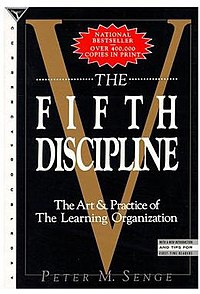The Fifth Discipline
From Wikipedia, the free encyclopedia
| The Fifth Discipline: The Art and Practice of the Learning Organization | |
 |
|
| Author | Peter Senge |
|---|---|
| Country | United States |
| Language | English |
| Publisher | Currency |
| Publication date | 1990 (first edition) 2006 (second edition) |
| ISBN | ISBN 0-385-26095-4 (first edition) ISBN 0-385-51725-4 (second edition) |
The Fifth Discipline: The Art and Practice of the Learning Organization (Senge 1990) is a book by Peter Senge (a senior lecturer at MIT) focusing on group problem solving using the systems thinking method in order to convert companies into learning organizations. It was first published by Currency in 1990. A revised and updated version was published by Currency in 2006. The five disciplines represent approaches (theories and methods) for developing three core learning capabilities: fostering aspiration, developing reflective conversation, and understanding complexity.
Contents |
[edit] The Five Disciplines
The five disciplines of the learning organization discussed in the book are:
- 1) Personal mastery
- 2) Mental models
- 3) Building shared vision
- 4) Team learning
- 5) Systems thinking- The Fifth Discipline that integrates the other 4
[edit] The Learning Disabilities
- 1) "I am my position."
People fail to recognize their purpose as a part of the enterprise. Instead, they see themselves as an inconsequential part of a system over which they have little influence, leading them to limit themselves to the jobs they must perform at their own positions. This makes it hard to pinpoint the reason an enterprise is failing, with so many hidden 'loose screws' around.
- 2) "The enemy out there."
- 3) The Illusion of Taking Charge
- 4) The Fixation of Events
The tendency to see things as results of short-term events undermines our ability to see things on a grander scale. Cave men needed to react to events quickly for survival. However, the biggest threats we face nowadays are rarely sudden events, but slow, gradual processes, such as environmental changes.
- 5) The Parable of the Boiled Frog
- 6) The Delusion of Learning from Experience
- 7) The Myth of the Management Team
[edit] The Laws of the Fifth Discipline
- 1) Today's problems come from yesterday's "solutions."
- 2) The harder you push, the harder the system pushes back.
- 3) Behavior will grow worse before it grows better.
- 4) The easy way out usually leads back in.
- 5) The cure can be worse than the disease.
- 6) Faster is slower.
- 7) Cause and effect are not closely related in time and space.
- 8) Small changes can produce big results...but the areas of highest leverage are often the least obvious.
- 9) You can have your cake and eat it too ---but not all at once.
- 10) Dividing an elephant in half does not produce two small elephants.
- 11) There is no blame.
- 12) Steady wins the race.
[edit] References
- Senge, Peter M. (1990), The Fifth Discipline, Doubleday/Currency, ISBN 0385260946, <http://books.google.com/books?id=bVZqAAAAMAAJ>
[edit] See also
[edit] External links
- Review of the book by John Paul Fullerton.

